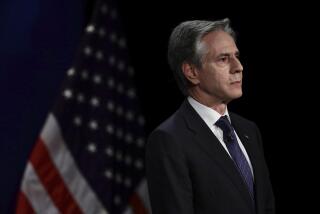Clinton Extends His Suspension of Anti-Castro Law Another 6 Months
- Share via
WASHINGTON — President Clinton, citing evidence that “the international community is more united behind the cause of freedom in Cuba than ever before,” ordered a second six-month suspension Friday of a law allowing American lawsuits against foreign companies doing business in Cuba.
The suspension further delays the implementation of the most contentious provision of a 1996 law that has infuriated American allies. This provision of what is known as the Helms-Burton Act allows American citizens to sue foreign companies in U.S. courts if these companies are operating in Cuba on property originally owned by the Americans.
Both Clinton, who issued the order from his vacation site in the Virgin Islands, and Undersecretary of Commerce Stuart E. Eizenstat, briefing reporters at the State Department, insisted that U.S. allies have now moved close enough to the American position on Cuba to justify the suspension.
But Eizenstat, who has traveled 50,000 miles in the last four months trying to assuage the feelings of the allies, acknowledged that Europe, Canada and Mexico all have retaliatory legislation in place should Clinton ever allow the lawsuits to go forward.
The presidential decision failed to fully satisfy either the originators of the law or its main critics.
In Washington, Sen. Jesse Helms (R-N.C.), chairman of the Senate Foreign Relations Committee and co-author of the act with Rep. Dan Burton (R-Ind.), said he was “extremely disappointed” by Clinton’s “terrible mistake.”
Helms acknowledged that “pressure from the Helms-Burton law has forced our European allies to take a tougher stand against Castro.”
But he said Clinton had issued “what is, for all practical purposes, an indefinite suspension.”
“I see no justification for giving our allies a permanent carte blanche to traffic in stolen American property as a reward for doing what they should have been doing all along,” he said.
In Brussels, European Union President Jacques Santer called the suspension “a step in the right direction” but said Europe wanted the law repealed.
“We remain firmly opposed to all extraterritorial legislation, whatever its source, and will continue to defend our interests,” Santer said.
The Europeans insist that the United States has no right to reach across international boundaries and punish their business people for investing in a third country.
A similar sentiment came from the U.S. Chamber of Commerce, a consistent opponent of economic boycotts of Cuba.
The suspension of the lawsuits is a useful step, said John Howard, the chamber’s director of international policy, adding: “We think an even better idea would be to repeal the statute that put it there in the first place.”
The administration clearly intended to deliver the message that it had succeeded for the first time in enlisting Europe in the battle against Fidel Castro’s Cuba.
Eizenstat said that his own mission, once derided as a “mission impossible,” has now been hailed as successful by the same critics.
“The United States seemed for too long to be singing solo on the need for human rights and democracy in Cuba,” he said. “Today there is more international pressure on Castro than at any time since his coming to power.”
Clinton cited a mid-December communique by the EU as a “historic common position binding all 15 member nations to promote democracy and reform in Cuba.” The president said the European action “explicitly makes any improvement in political or economic relations with Cuba contingent on concrete advances in human rights and political freedoms on the island.”
The EU, while calling for “a peaceful transition to pluralist democracy, respect for human rights and fundamental freedoms in Cuba,” did not say it would curtail trade with and investment in Cuba. But it pledged to suspend any governmental agreement with Cuba if the Castro government committed a serious breach of human rights.
Eizenstat failed to persuade either the Mexican or Canadian government to sign anything similar to the European statement.
Asked about Canada, which expressed its continued disapproval of the measure on Friday, Eizenstat said: “Canada has its own way of acting. We will continue to have consultations with them, and we will see what develops from that.”
He said the Helms-Burton law has succeeded in dampening enthusiasm for foreign investment in Cuba.
“We believe that companies are certainly thinking twice,” he said. “We . . . know of 12 instances at least where activities on confiscated property were stopped or activities were refrained.”
He cited the decision of Cemex, the Mexican cement company, to withdraw an investment from Cuba.
Originally opposed to the Helms-Burton legislation, Clinton embraced it during the emotional outburst that followed the shooting down by Cuban MIGs of two U.S. civilian aircraft piloted by Cuban exiles over or near Cuba in March.
Aside from the provision permitting U.S. lawsuits against foreign companies in Cuba, the long law includes several other controversial provisions.
One, which has also angered allied governments, denies U.S. visas to foreign business people operating in Cuba on property once owned by U.S. citizens. The families of the business people are barred from the U.S. as well.
Another provision codifies the U.S. economic boycott imposed by President Kennedy more than 30 years ago. That means that neither Clinton nor any future president can lift the boycott unless authorized to do so by an act of Congress.
More to Read
Sign up for Essential California
The most important California stories and recommendations in your inbox every morning.
You may occasionally receive promotional content from the Los Angeles Times.










